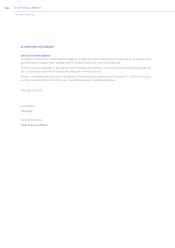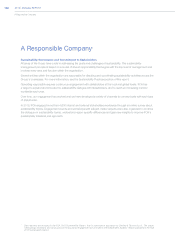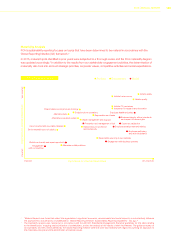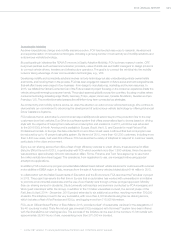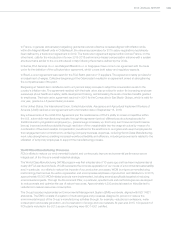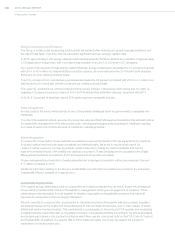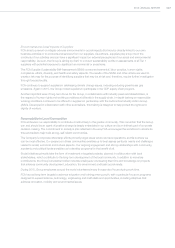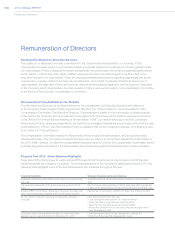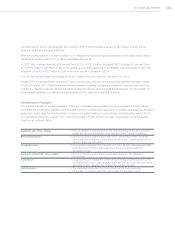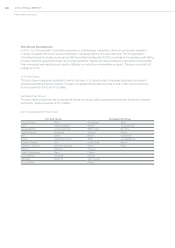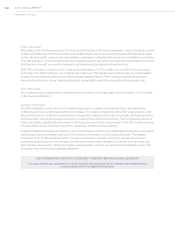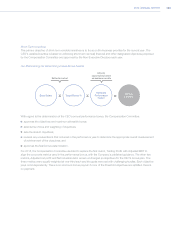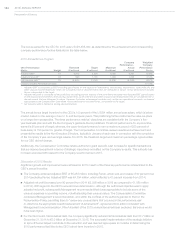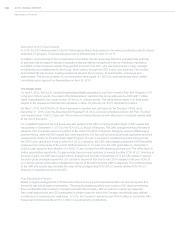Chrysler 2015 Annual Report Download - page 116
Download and view the complete annual report
Please find page 116 of the 2015 Chrysler annual report below. You can navigate through the pages in the report by either clicking on the pages listed below, or by using the keyword search tool below to find specific information within the annual report.
116 2015 | ANNUAL REPORT
A Responsible Company
Energy Consumption and Emissions
The Group is continuously researching solutions that will enable further reductions in greenhouse gas emissions and
the use of fossil fuels. Over time, this has generated significant savings in energy-related costs.
In 2015, approximately 3,300 energy-related projects developed under WCM contributed to a reduction of approximately
3,700 terajoules in energy used, with a corresponding reduction of around 315,000 tons in CO2 emissions.
As a result of the success of these energy-related initiatives, energy consumption decreased by 0.4 percent compared
with 2014 to 48.4 million GJ despite stable production volumes, and was well below the 2010 level in both absolute
terms and on a per vehicle produced basis.
Total CO2 emissions from manufacturing processes decreased by 4.6 percent compared with 2014 to 4.1 million tons,
well below the 2010 level also on both a total and per vehicle produced basis.
FCA uses CO2 emissions per vehicle produced as the primary indicator of its energy performance and, for 2020, is
targeting a 32 percent reduction, based on 2014-2018 Business Plan estimated volumes, compared with 2010.
In 2015, 21.9 percent of electricity used at FCA plants was from renewable sources.
Water Management
In many parts of the world, water scarcity is one of the greatest challenges faced by governments, businesses and
individuals.
To protect this essential natural resource, the Group has adopted Water Management Guidelines that establish criteria
for sustainable management of the entire water cycle, including technologies and procedures to maximize recycling
and reuse of water and minimize the level of pollutants in discharged water.
Waste Management
To reduce the consumption of raw materials and related environmental impacts, FCA has implemented procedures
to pursue optimal recovery and reuse of materials and minimal waste. We strive to recycle what cannot be
reused. If neither reuse nor recovery is possible, waste is disposed of using the method available that has the
least environmental impact, with landfills only used as a last resort. These principles are incorporated in the Waste
Management Guidelines formalized in 2012 and adopted at Group sites worldwide.
Proper management and reduction of waste generated led to savings of around €4 million and revenues of around
€17 million worldwide in 2015.
Additional information relating to the Group’s sustainability commitments and results are provided in the interactive
Sustainability Report available on fcagroup.com.
Sustainable Supply Chain
FCA regards strong relationships, built on cooperation and mutual understanding, as vital to ensure the widespread
incorporation of sustainability criteria in the selection, management, training and engagement of suppliers. These
relationships make it possible to work together to develop responsible and sustainable practices that help limit
exposure to unexpected events and supply disruption.
We are committed to equal and fair opportunities for all parties involved in the supplier selection process. Suppliers
are selected based on the quality and competitiveness of their products and services, and on their respect of social,
ethical and environmental principles. This commitment is a prerequisite to becoming an FCA supplier and developing
a lasting business relationship with us. Suppliers must carry out business activities according to the ethical standards
and procedures in place in the country/countries in which they operate, and as set forth by the FCA Code of Conduct
and Sustainability Guidelines. If a supplier fails to follow these principles, the Group can require the supplier to
implement a corrective action plan.


